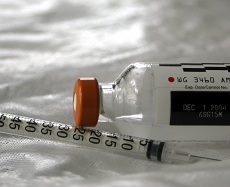Requirements for CMV Drivers with Diabetes

Author: Matthew McQuillan, J.D.
Diabetes is a serious and increasingly common medical condition. When conducting medical examinations, the certified medical examiner should be familiar with the requirements and regulations for those applicants with diabetes, in addition to other specific conditions. The general medical requirements for commercial vehicle drivers are found at 49 CFR § 391.41. As it relates to diabetes, a driver is medically qualified if there is, “no established medical history or clinical diagnosis of diabetes mellitus currently requiring insulin for control.” 49 CFR § 391.41(b)(3). Based on the regulation’s plain language, diabetes is not a disqualifying condition if insulin has never been or is no longer required.
Insulin dependent diabetes has been a disqualifying condition under the Federal Motor Carrier Safety Administration’s (FMCSA) regulations since 1970. Studies at that time showed these individuals were involved in accidents at a higher rate. The FMCSA reevaluated the evidence in 1977, but the regulation was upheld with no waiver or exemption process. In 1993, after researching the issue and soliciting public comment, the FMCSA began a case by case waiver program. This involved additional certification from specialists and more frequent examinations during the license period for those who qualified. In 1996, a court case overturned a similar waiver process for vision problems, leading the FMCSA to end the diabetes waiver program.
A Medical Expert Panel (MEP) looked into the issue again in 1999 and determined that treatment advances made it safe for some with insulin controlled diabetes to operate commercial vehicles. A report issued by an additional MEP in 2001 also looked at programs in other states and federal agencies, such as the Federal Aviation Administration, and determined a waiver program was appropriate. The report identified three areas a waiver program would need to address: (1) screening, (2) management guidelines, and (3) monitoring. Based on these reports and the recommendations, the FMCSA began a new exemption program.
Due to the FMCSA’s authority, a waiver only applies to those seeking a license to operate commercial vehicles in interstate commerce. State regulations likely exist and do not have to conform to the federal guidelines. Under the FMCSA’s requirements, the applicant is responsible for compliance with all of the waiver and exemption provisions.
As the first step in obtaining a diabetes exemption, the applicant must undergo the standard medical examination. The applicant must be medically qualified in every other way before beginning the exemption process. The examining professional must note the applicant is certified only if a diabetes exemption is granted. Until the FMCSA grants an exemption, the medical certificate is not valid. The conditional medical examination certificate is valid for one year to allow the applicant time to complete the additional steps.
The applicant must then be evaluated by an endocrinologist and either an ophthalmologist or optometrist. If the applicant has a prior diagnosis of diabetic retinopathy, the vision examination must be completed by an ophthalmologist. The applicant must then provide the FMCSA with the completed examination forms. These specialists’ examinations are valid for six months.
The FMCSA will evaluate the exemption application to determine if the applicant is eligible. The driver’s basic information is published for a 30 day public comment period. Provided there is no contradictory evidence, the agency will grant the exemption if all other paperwork is in order. From the date an applicant submits the necessary exemption paperwork, the FMCSA has 180 days to make its decision.
Once granted, the exemption is good for two years provided the applicant complies with the monitoring requirements. These include quarterly reports from a board certified or board eligible endocrinologist. The endocrinologist must evaluate the driver’s daily glucose monitor and certify the glucose levels were between 100 and 400 while operating a vehicle. Each year, the applicant must also submit to a full medical evaluation by an endocrinologist.
While the exemption process and continuing requirements may be cumbersome, they help ensureonly those with well controlled diabetes are allowed to legally operate commercial vehicles. A MEP issued an additional report on diabetes in 2011 and the FMCSA will continue to evaluate the issue and adjust or eliminate the exemption program if needed. The National Registry of Certified Medical Examiners (NRCME) updated guidelines related to diabetes can be found in the medical examiners handbook listed here:

